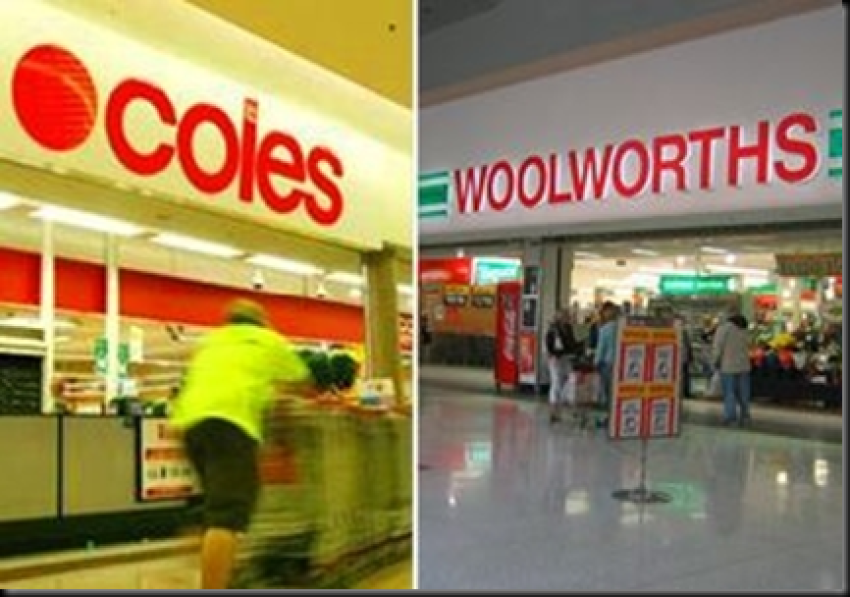
Like all wars, the “price war” between the two big supermarket chains — Woolworths and Coles — has its casualties. It is in the countryside and ordinary households that the toll is being counted, not in the profits of the two giant corporations.
A key factor is the grip that the two giants hold over food sales. Australia has one of the most concentrated grocery markets in the world. Coles and Woolworths represent 80% of all supermarket sales.
They have used this powerful position to ensure their profit margins continue to grow.
The Department of Agriculture, Fisheries and Forestry Australian Food Statistics 2010-11 report said both corporations increased their retail margins for food and liquor sales between 2004-05 and 2010-11.
In 2010 alone, adding up combined food, alcohol (60% of the market) and petrol (50%), the big two took home $94.3 billion of the $242 billion spent in all shops by Australian households, a Commonwealth Bank study said.
This position of economic dominance has allowed them to make producers and consumers the victims of their war. The big two have brought “down” the prices they pay suppliers, while forcing consumers to fork out more.
Many farmers now rely on the supermarket giants to sell their goods. They can either accept the low prices offered by the duopoly or go out of business.
A joint submission by Food Connect and CERES Fair Food to the Australian Competition and Consumer Commission said the result has been “a mass exodus of farming families walking off the land at the rate of 25 per week”.
Food manufacturers are also feeling the pinch.
For example, the “price wars” led to the 2009 collapse of the tomato processing company Cedenco, while Heinz dramatically scaled down its Australian operations.
Workers and suppliers are suffering the most. The Australian Food Statistics 2010-11 report said the number of workers employed in food and fisheries production in 2010-11 was only two-thirds that of 2000-01.
Evan Jones, an honorary associate at the University of Sydney’s Department of Political Economy, said in The Conversation in April last year that the supermarket giants are “profiting from extractions from suppliers”.
He cited official figures showing how in 2001-02, Coles reported a net operating profit of $345 million, at the same time as it squeezed $651 million out of suppliers in the form of rebates and discounts.
Woolworths reported a profit of $792 million in 2004-05, although much of this was due to the $601 million it forced suppliers to hand over in the form of rebates and discounts.
More up-to-date figures are not available, says Jones, because “previously, retailers were required to report ‘rebates and discounts’ obtained from suppliers — a requirement that unfortunately lapsed with new accounting standards”.
Video: Woolworths and Coles: Supermarkets to Superpowers? | The Beast File. Real Human Stories.
Spokespeople for the big two argue that consumers are the real winners because supplier “discounts” are being passed onto them, but there is little evidence to back this up.
In fact the opposite is true: the drop in prices among some “discount” items are being more than compensated for by increases in many others.
Commonwealth Bank retail analyst Andrew McLennan told the April 18 Australian Financial Review: “There have been price increases going through that haven’t resulted from increases at the supplier’s end. It’s purely margin management by the retailers.
“Retailers are going head to head on promotions on particular lines and lifting prices on others.”
Consumers are not just paying more from their hip pockets but also with their health.
The current price wars are said to heavily impact on food quality. The April 21 Sydney Morning Herald reported allegations that milk producers are adding permeate, a dairy by-product, to milk to help them cope with the impacts of the “milk war” on their incomes.
In the end, producers are being forced out of business, consumers are paying more for lower quality (with all the health consequences associated with a poor diet), and the supermarket giants continue to rake in bigger profits.
Clearly something has to be done about this.
The starting point must be identifying the root cause of this war wreaking havoc on producers and consumers alike.
For some, such as Kate Carnell, who until last March was the head of the Australian Food and Grocery Council, the issue is one of a “market failure”.
The problem, she told the April 21 Sydney Morning Herald, was that even “if the outcome is that people go broke or that fundamentally it’s not a very fair market, that’s actually not illegal.”
Carnell said the market should be made fairer through greater regulation.
More regulations would be welcome, but several important regulations already exist: there is just no will to impose them.
Instead, as Jones noted, “both economic and legal cultures defend and reinforce the survival of the most powerful, as opposed to the survival of the fittest”.
If stronger regulations were put in place (and actually enforced), they would merely prove to be a minor irritation to the corporations, while failing to tackle the real issue.
Australia’s food problem is not one of market failure but economic power. And this very power is the direct result of the “market” being directed not towards meeting the needs of consumers and producers, but rather the need of corporations to continuously accrue bigger and bigger profits.
Only by transforming our agricultural and food systems, and placing them on a radically
different footing — one which views food not as a commodity to be sold on the market, but instead as a basic human right for all — could we put an end to this war for profit.
Comments
Anonymous replied on Permalink